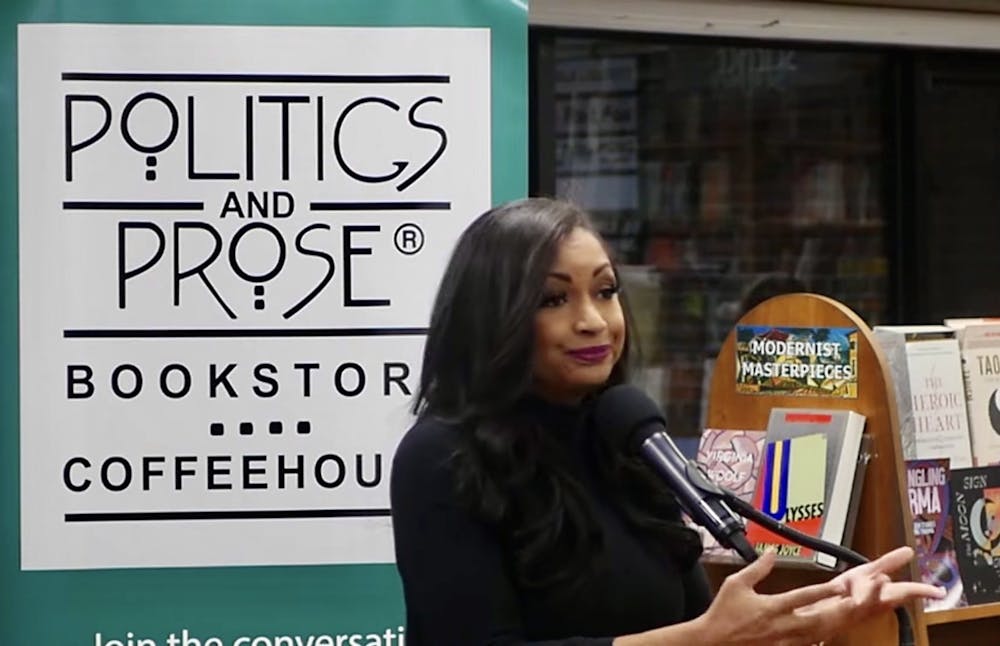As part of the many events in the D.C. area this Black History Month, Politics and Prose hosted a series of talks and readings focusing on topics related to the experiences of Black people in America from Feb. 2-7. These readings act as a starting rather than an ending point for valued and necessary conversations.
“Bet on Black: The Good News about Being Black in America Today” by Eboni K. Williams
Eboni K. Williams sought to show her audience what Blackness “truly is” in this book. At the talk, Williams focused on why she wrote the book, as well as the importance of sharing her thoughts and story. She came in with vigor, a passion for what she is arguing for and unparalleled confidence.
Using her influence as an author and media personality, Williams has drawn attention to the beauty and excellence of Blackness. Williams said that focusing on projecting a positive image of Blackness is an ongoing mission for her, and understanding the power of history is vital for fighting against the constructs of racism in America. Williams said she will not concede to “anyone or any element.”
She spoke about her intention to combat hostile efforts to undermine Black history, engaged with the audience and encouraged them to ask her questions about her writing process, television appearances and personal beliefs.
Providing a space where people are encouraged to adopt a more positive mindset is a powerful tool in order to change people’s perceptions of the Black community and highlight its beauty and importance, she said. She spoke briefly about her background growing up with a single mom and insisted on the importance of developing an accurate understanding of Blackness.
“I wanted to write a whole book that talks about why I celebrate who we are as Black people,” Williams said.
“Police Brutality and White Supremacy: The Fight Against American Traditions,” by Etan Thomas
Police brutality against Black people in the United States and understanding how to dismantle the practices and systems perpetuating it is an ongoing conversation. Etan Thomas gave an in-depth interview about his book which features multiple interviews and commentary from the lived experiences of people within the African diaspora, including Thomas himself.
The book gave a look into the personal narratives of Raymond Santana, who is one of the now-exonerated Central Park Five, Rodney King's daughter, Lora Dene King, and other notable public figures.
Thomas is a former NBA basketball player and was able to explain the ways social justice, protest and sports intertwine. At this talk, hosted by Dave Zirin, Thomas opened up by framing that topic.
“We matter, you know? We matter. I was really focused on the athletes’ voice, and promoting the athlete voice, and how important it is and how effective,” said Thomas. “I talked to athletes of yesteryear and now. I also wanted to take a deeper dive into the rich, infamous history of racism, white supremacy and police brutality in this country.”
Thomas seemed to not shy away from confronting head-on conversations some people may feel uncomfortable having. During the talk, Thomas also addressed how the feedback received from readers was mostly on how his book brought up discriminatory and racist concepts that were new to them.
“Unfortunately this is not a subject that is going away anytime soon. It’s an ongoing situation, and there are so many different aspects to it no matter who is in office, no matter who is head of what police department, these issues keep coming up,” said Thomas when asked by Zirin if his book had an audience because it “meets the moment.”
Thomas offered solutions and practical ways to work against the promotion of white supremacy in law enforcement.
“We keep putting bandaids on the situation; we don't have real police reform and accountability,” said Thomas. “There’s so much that could be done, and it’s so frustrating because I work with impacted family members. And the thing that is in common with all of them is that they are all fighting for laws to be changed in their particular cities.”
“Ain't But a Few of Us: Black Music Writers Tell Their Story,” by Willard Jenkins
Willard Jenkins, Don Palmer, Steve Monroe and Gene Seymour hosted a panel on Feb. 4 with a surprise guest of A.B. Spellman. Jazz and the contributions of Black music writers to the industry was discussed.
The writing of Jenkins’ book, “Ain’t But a Few of Us: Black Music Writers Tell Their Story,” began after he noticed a lack of Black writers within the space of jazz critique. Seeing this, Jenkins set out to catalog resources for individuals interested in the history of jazz in an anthology, which includes work from Spellman, Stanley Crouch and more notable jazz writers. However, Jenkins also wanted to give voice to the overlooked Black writers who have helped keep jazz alive in the form of interviews with countless writers.
Having noticed the abundance of white writers steering the conversation surrounding jazz, Jenkins felt it necessary to reclaim the context that surrounds jazz. In relation to the title of the book, Jenkins asked the panel how they realized Black writers weren’t published.
“Yeah, I noticed,” Palmer said. “It was hard not to.”
Seymour, who contributed to the book, said “All of us have had the experience of being the only person of color in the room.” Seymour went on to explain how upsetting it was to see white writers “... writing about something [Black writers] have a familial, blood-relation to, and watching someone else carry on the conversation.”
The panel stressed the importance of other young writers engaging with jazz and music. They implored writers to discover music, but more importantly, to support and write about what they might find.
Other books included in the series were “What Napoleon Could Not Do” by DK Nnuro, which details the story and markedly-different experiences of two Ghanaian siblings who face discrimination in the U.S. and “When Innocence Is Not Enough: Hidden Evidence and the Failed Promise of the Brady Rule,” by Thomas L. Dybdahl, who used his real expertise as a former defense lawyer to explain the trajectory and pushback of the 1963 Brady Rule, which said “prosecutors must share favorable evidence with the defense.”
Overall, the week seemed to include a powerful message that looking holistically at a non-homogenous community whose lived experiences and voices can act as a valuable wealth of knowledge.
The DMV has many other events honoring Black History Month.
The National Museum of African Art will have its exhibition Visionary: Viewpoints on African Art, on display for the rest of February; Busboys and Poets is hosting a talk on the book, “Don’t Mute Moe” on Feb. 19, which focuses on the author’s life and work of “empowering Black youth and families;” and on Feb. 22, Howard Theatre will have WPGC 95.5FM to present its show “The Good Morning Show: After Dark!”
This article was edited by Hannah Langenfeld, Kylie Bill and Nina Heller. Copy editing done by Isabelle Kravis, Sophia Rocha and Stella Guzik.





